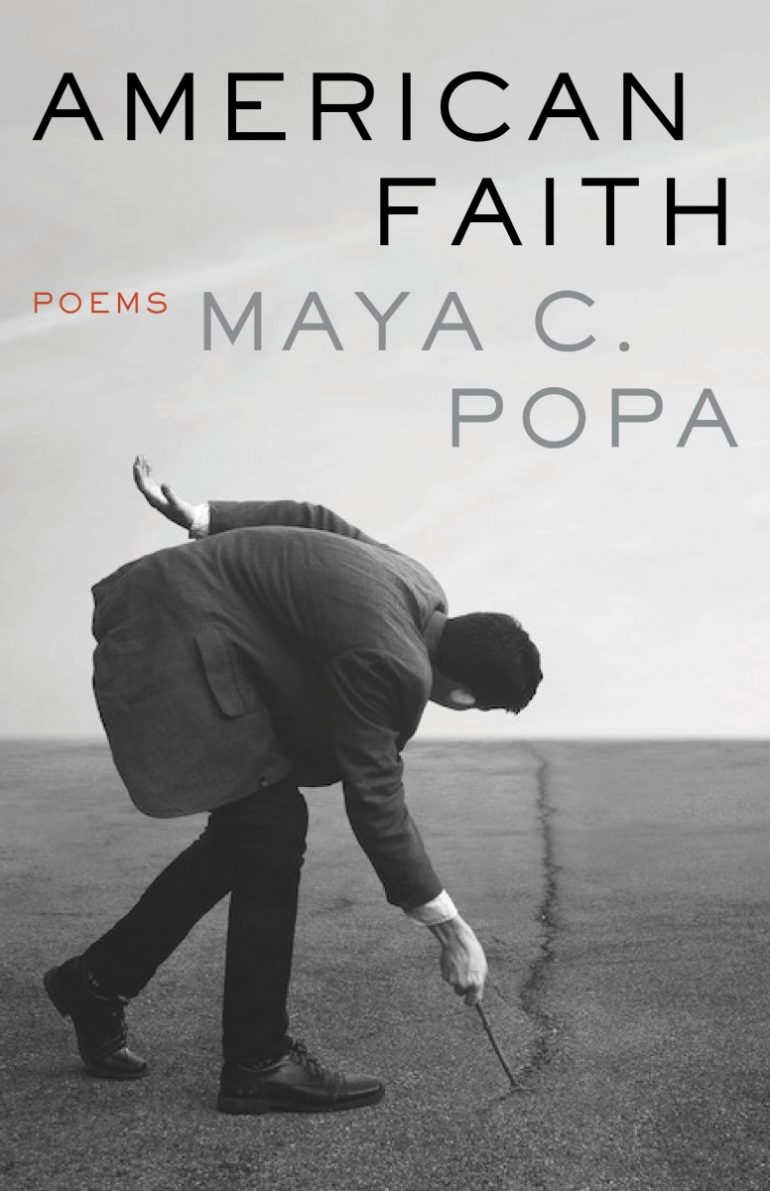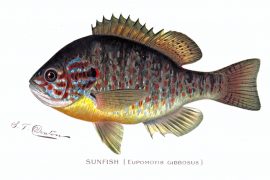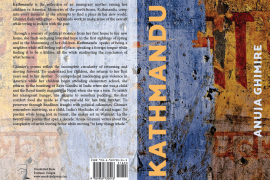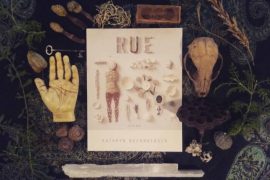The stand-out debut from Romanian-American poet Maya C. Popa is impossibly titled American Faith. Impossible because of the line-leader ideal that an American faith is so all-encompassing, and also so against generalization, that it cannot be defined but through metaphor. Impossible, because conspiracy theories have shaped these years of American life, circles of pathologizing explanation that have caused deep tragedy, anxiety, and the plasticity of fact. Popa draws an open line around that impossibility. Poetry, too, often seems impossible to me, always tending away from whatever consigns the past, never quite able to prophesize the future.
What do you believe? Better yet, how do you come to realize what you don’t believe? American Faith does not simply transcribe a history of what leads to these moments of conclusion: our memories, our lives, who we love. The past which adapts to the present, the past which does not:
I could picture that vast absence of us,
moons spinning coolly in unscripted pasts.
But when I try to imagine our president,
understanding imagination is the basis
of all faith, I suffocate on hatred’s loneliness.
In these lines from the title poem, the modal verb of the first sentence invites us into possibility, to a realization of the moon as a marker of time, to someone envisioning absence and in turn making themselves present. The second sentence conditions us to the opposite, an imaginative failure, a constriction. This quick transition suggests something about the way these poems organize time: the act of keeping faith is not exclusive to a future in which that faith is fully realized, but a matter of attention in the present. The poem ends: “Is that faith? While the days, / impatient, fresh beasts, appeal to me— / You are here now. You must believe in something.”
A response to You must believe in something isn’t necessarily bound to something doctrinaire. One can also answer—I would likely answer—I believe in feeling, this strange impulse towards myself. Popa reports what patterns might lead us to rationalize, then, how we make sense of that impulse. Why do I feel this way, does it make sense? Does it matter if it makes sense? How is this impulse basically and structurally different from how we (hopefully) examine our principles, our ideas, our actions? In a poem that comes to us late in her collection, “A Technique for Operating on the Past,” Popa meditates on what it takes to assemble a symbol from the past, from a memory: “My great-grandfather held a brain and studied it for signs of music. / Like all the men in my family, he was a close reader and musician.” Two sentences again, two lines: the first, a tangible object which evokes the past of this poem—a man examining a brain in his hands—then the past beyond the past when that brain belonged to someone. The next line of this couplet contextualizes the first. A palimpsest, it implies a future in which the men in this family have and will continue to read, to learn an instrument, a future in which the family continues to study the brains they hold: a framework to recognize one’s feelings when “I see him make the first / incision.”
Another way of answering You must believe in something is with a question: well, what do you believe? Teach me—or adversely, prove something to me. “Meadowlarks and Markers,” a poem organized in prose-stanzas, combines the sentiments of teach me how to believe with the assertion prove what you believe:
Always, I imagine, it is Milton asking, his dreams so vivid they burn
through sight. Do you believe, like him, in the parable of talents, the
entrusting and the multiplication? What tree bore the gun—who tends it?
Not sacrifice, not pleasure. What am I asking you about terror?
To believe in a parable, I imagine, means to believe in how—not what—the story teaches its listeners to live. The genre is structurally artificial: a disciple recounting a story for an audience initially told by some other figure to some other audience. A redemptive narrative within a moralizing story within a tale we ourselves hear: three sets of stories, three sets of listeners. If parable indicates much about this book’s relationship to tragedy, to redemption, to the acts of learning and teaching, poetry is a form that depends on its organization of time. “Memory making more memory for me to write from,” Popa continues later in the poem. American Faith doesn’t try to describe a before for the making of these poems, but more generously, Popa shows what happens imaginatively when one tries, and later fails, to distinguish themselves from that time.
What makes these questions American, and why does any response depend on the question’s own being asked? Two back-to-back poems—and I group them this way because more than others they seem to respond to each other—answers the question with a question. The first, “The Song of Male Aggression,” remembers being exposed to the masculine twining of love and violence: “One boy offered me a necklace, / another cut it from my throat.” The poem adapts to its own making, to the metaphors of music which frame lyrical language; it “learns to listen for variations.” In a collection so adamant about music, a family of musicians, songbirds recorded, this poem nudges us to remember what seems melodious can also, sinisterly, function predatorily. “American Cowboy,” on the next page, satirizes an equally predatory sound, manipulative bait cushioned in rhetorical zigzagging:
When the politician takes
his gun out on the stage,
we’re meant to feel wonder
he hasn’t shot us,
grateful to leave with our lives.
Observing what one is “meant to feel” largely depends on noticing how that person does not, in turn, feel what they’re meant to feel, that degree of wonder. Like a conspiracy theory, it’s a process of misconstruing the fact, the feeling, the idea all conveniently in front of you, as Popa advises here, “don’t mistake terror for adoration.” A cowboy, for some, might seem like a mid-century American symbol of faith, a fruitless belief in some never-ending journey—but ultimately, responding to the “masculine delirium” of this genre of symbol, Popa asks, “What will it take / to start over again // with a myth we might perhaps outlive?” Some stories heard forever, those often-called myth, had also become parable after they were told.
Popa’s poems reckon with that very moment of telling. In “Hummingbird,” she describes the animal knocking at her window: “And though a guest with too delicate a coat, / she never drops a feather, an unfulfilled parable…” Fulfilling a parable depends on inventions of that past, instructing listeners in the present. The poem continues, “…while inside our losses gracelessly accrue / without logic or pattern and we wonder at that.” As a parable becomes insofar as the present moment of listening, the poems of American Faith do not teach its readers how to live. They trust us to feel this wonder at the patterns of metaphor, of the capacities of poetry.
The degree to which any series of poems asks bold questions about its present doesn’t make that book more or less timestamped. If the language carries particular objects of its year, as American Faith carries “canceled governments” and godfathers voting for Trump, I might read it more readily with an eye towards the social, the context for my own encountering these poems. But equally true, what seems publicly generative for the book is never truly separate from its formal patterns—form is not nearly as prescriptive, not as ambiguously timeless—and it’s largely a mistake to read certain poems politically, for their rhetorical punches, and others for their tender treatment of metaphor and language and feeling. Who could possibly separate the two? How does this poem, here in front of you, ask to be read? In “The Lyric I” Popa instructs, with all tender permission for everyone encountering this poem right now, “Let the things that I’m afraid of / be things.”




